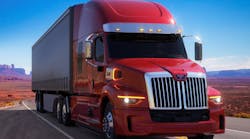Performance concerns about engines modified to meet the next round of federal diesel-engine emissions requirements could lead to extending life cycles for current equipment, pre-buying new equipment before the requirements take effect in October, or even buying used equipment, according to Don Schneider, president and CEO of Schneider National Inc.
Speaking at a seminar for industry suppliers sponsored by the Heavy Duty Manufacturers Assn., Schneider said that “Our primary concern isn't (reports of increased) fuel costs as much as vehicle downtime.” Unsuccessful efforts by the carrier to acquire engines that meet the new requirements for fleet testing have raised concerns that “we'll be dealing with things that haven't been engineered properly,” he said.
“The wisest thing would be for EPA to back off (on the new emissions levels) until we have reliably tested engines,” he said. If EPA does not extend the October deadline, “we could extend the life of our (current) vehicles by two or three years,” Schneider said. The company, which is the country's largest truckload carrier, also has commitments from truck manufacturers to pre-buy trucks before the new regulations take effect.
Speaking at the same seminar, executives from International Truck and Bus, Volvo Trucks of North America, Mack Trucks and Cummins Engine Co. disagreed, saying reliable engines and trucks will be ready by the October deadline.
The one dissenter among the manufacturers was Caterpillar Inc., which will delay introduction of engines meeting the stricter emissions levels until mid-2003 when it will introduce new engine technology.
All manufacturers present, however, did agree that meeting the new emissions levels will add $3,000 to $5,000 to the cost of a heavy-duty vehicle.


